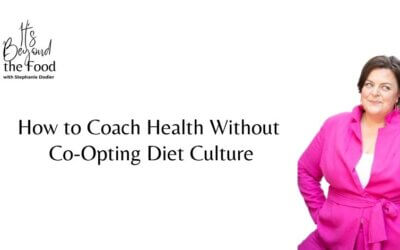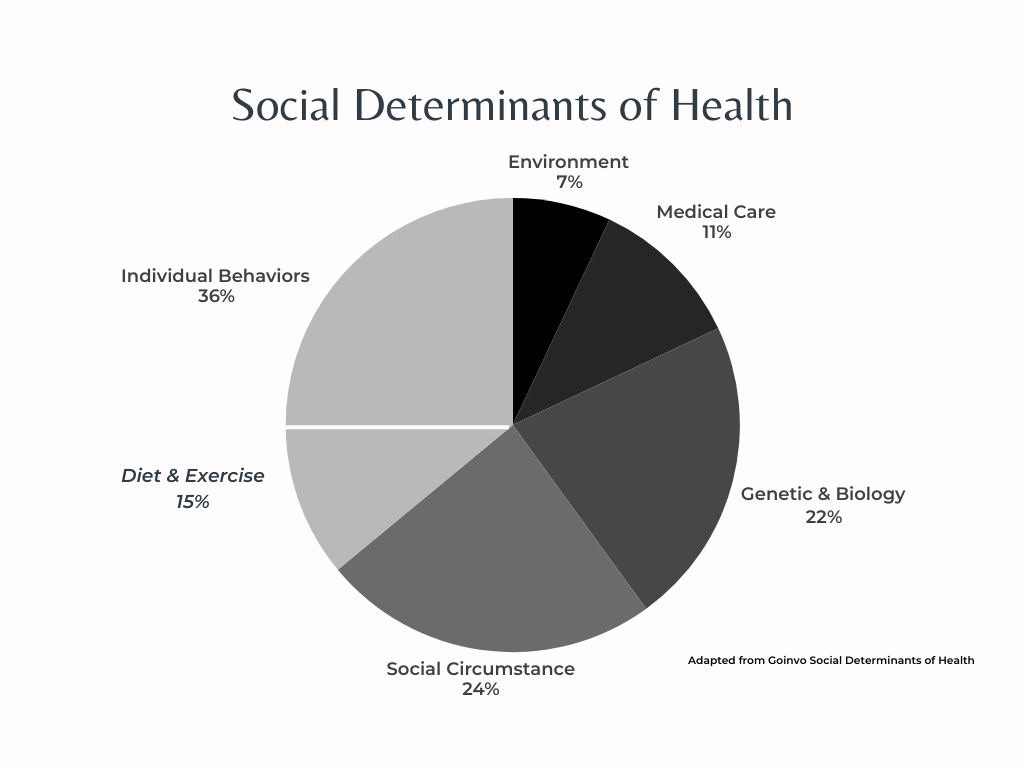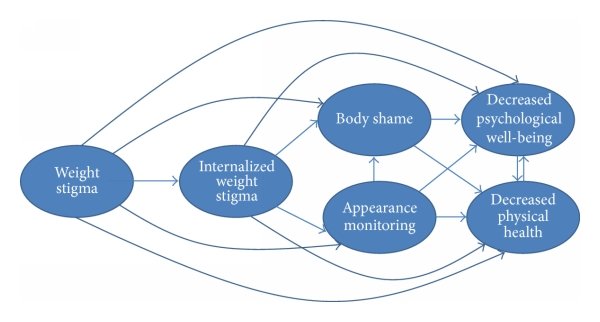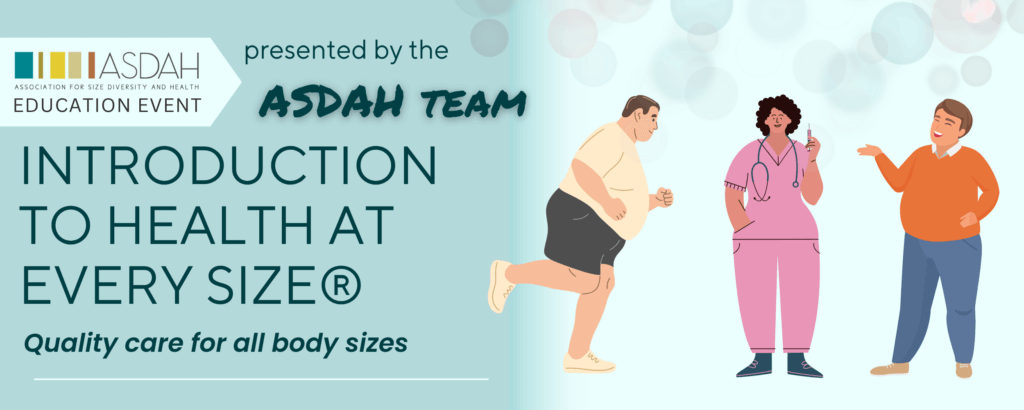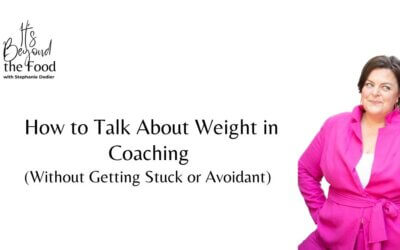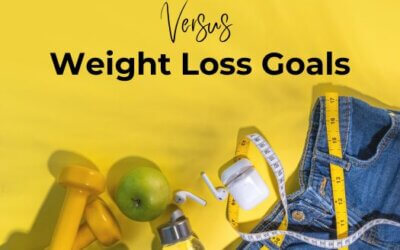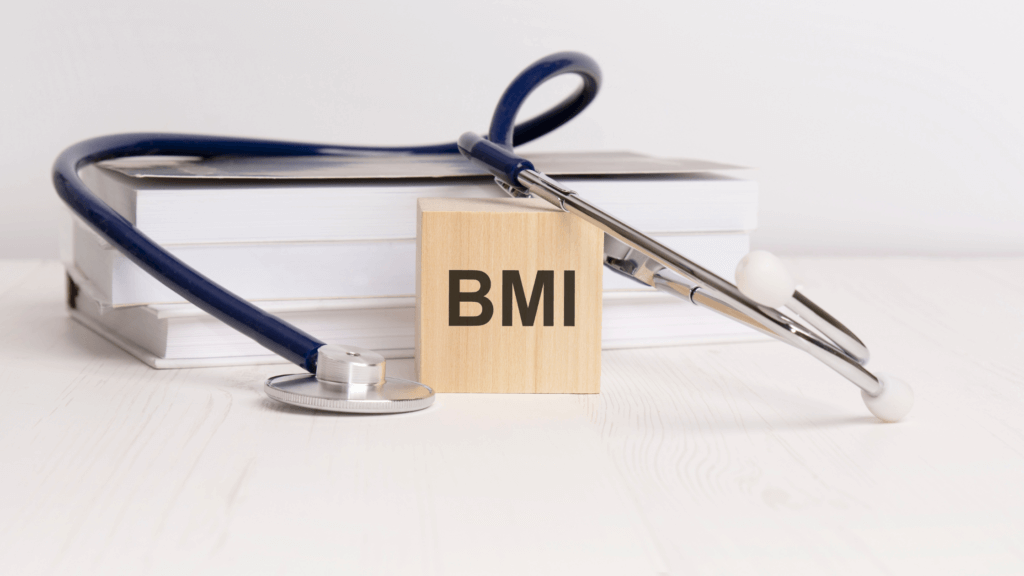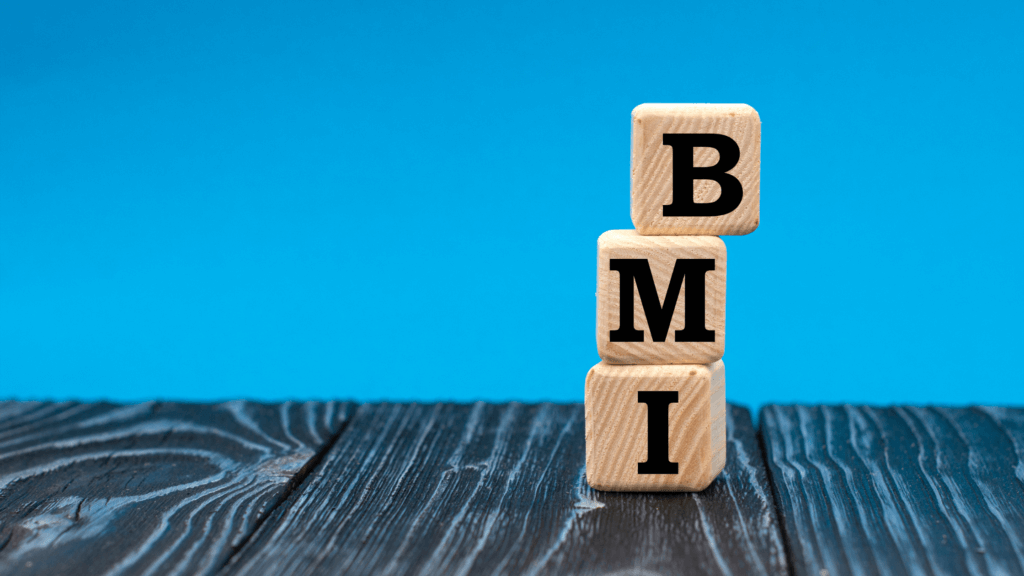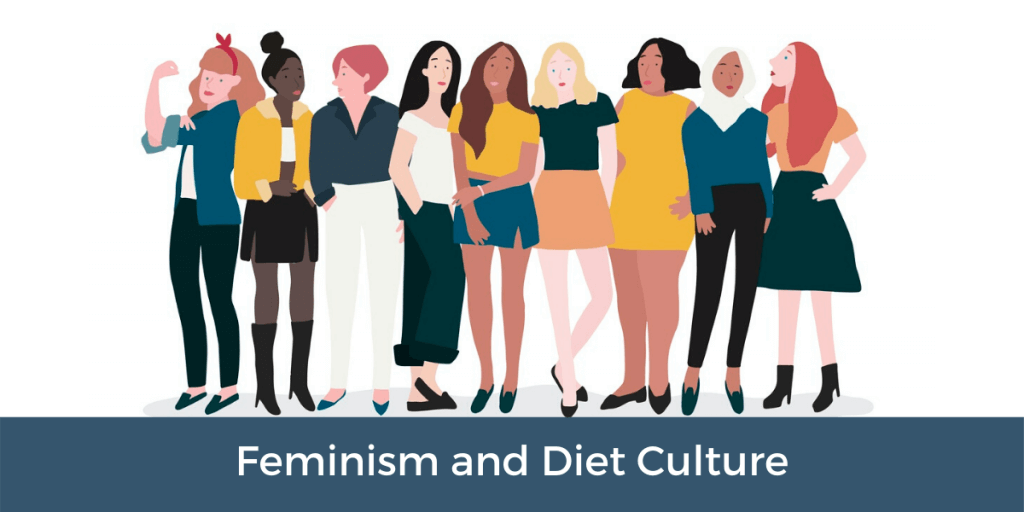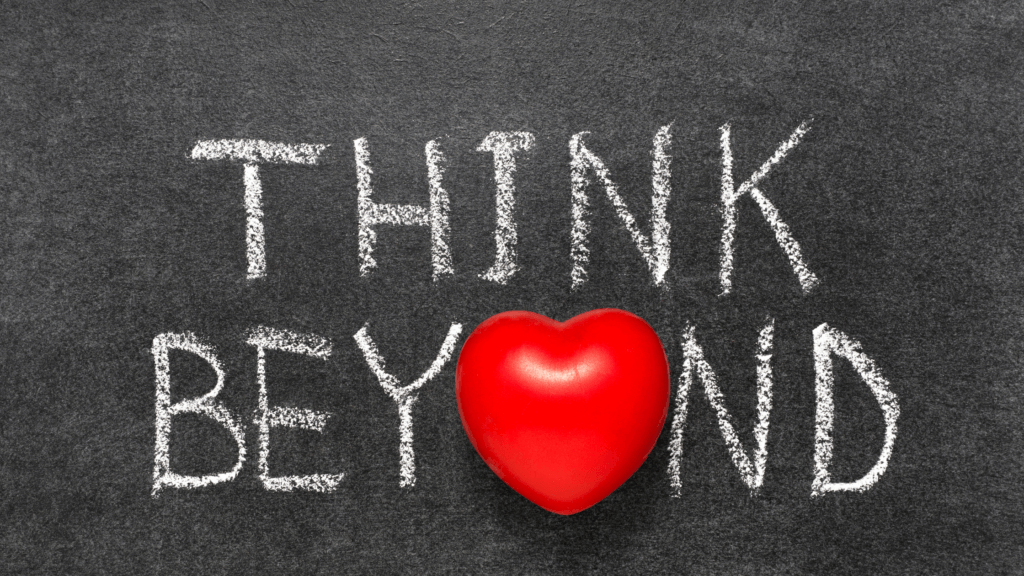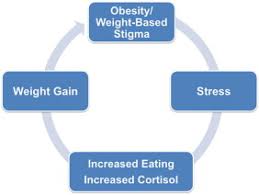Health Blogs
How to Coach Health Without Co-Opting Diet Culture
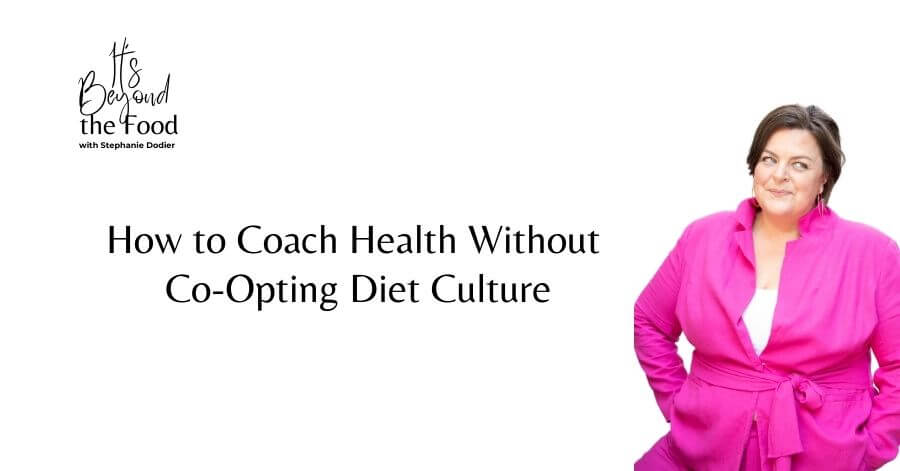

In the world of health and wellness, one question keeps coming up for thoughtful, anti-diet professionals: Can I coach health without reinforcing diet culture? If that question’s been echoing in your mind, you’re not alone—and you’re not off track.
Most of us were trained inside systems that equate weight with health. We learned to treat weight loss as the goal, the cure, the gold standard. And our clients? They’ve been socialized in the exact same paradigm.
But what if we told you there’s a better way? One that honors your clients’ whole humanity—body, mind, and spirit—without falling back into weight-centric scripts. That way is called weight-neutral health coaching. And this guide is your first step into that world.
What Is Diet Culture—and Why It Matters
Before we talk alternatives, let’s name the problem: diet culture.
Diet culture is a belief system that assigns moral value to body size, promotes thinness as health, and pushes restrictive eating as virtue. It shows up in our training programs, our textbooks, and even the well-meaning advice we give clients.
And it’s not neutral.
- It leads to body shame and disordered eating
- It reinforces systemic oppression
- It narrows health to physical appearance
As coaches and practitioners, when we operate inside this framework—whether knowingly or not—we reinforce harm. Even with the best of intentions.
Rather listen to the audio version of this blog? We’ve got you…
What Is a Weight-Neutral Approach to Health?
Weight-neutral health coaching begins with the radical idea that weight is not the defining factor of someone’s health.
Instead, it looks at health as multi-dimensional:
- Physical
- Mental
- Emotional
- Spiritual
- Social
It considers the whole person, not just the number on the scale. That includes their identities, their lived experiences, and their environment—the full spectrum of what’s known as the social determinants of health.
Why Coaching Health Without Diet Culture Matters
Let’s get one thing straight: this isn’t about being soft. It’s about being effective.
Weight-centric health coaching doesn’t work long-term. It creates yo-yo cycles, disconnection, and shame.
Weight-neutral coaching, on the other hand:
- Promotes sustainable behavior change
- Centers bodily autonomy and emotional safety
- Encourages curiosity instead of judgment
It’s not just possible—it’s essential. And your clients are ready for it.
8 Tangible Ways to Coach Health Without Co-Opting Diet Culture
You don’t need to overhaul your entire practice overnight. Here are 8 places to start:
1. You Can’t Hate Yourself Into Health
Most clients arrive believing they have to suffer to succeed. Your job? Help them unlearn that.
Focus on healing body image and building worthiness that isn’t tied to appearance. Research shows poor body image is a predictor of disordered eating. Body dissatisfaction is the best known contributor to eating behavior disturbance.
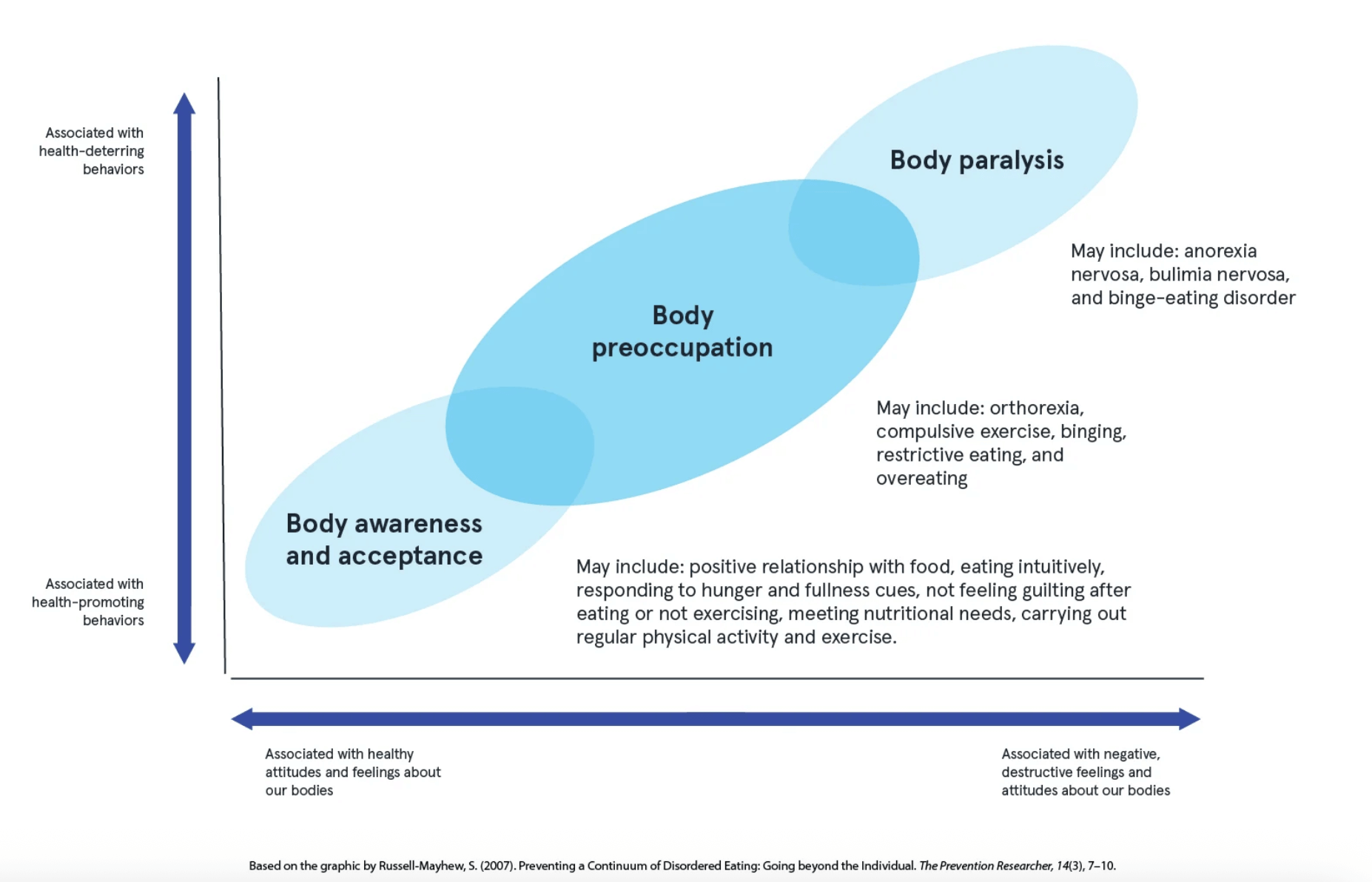

2. You Can’t Stress Yourself Into Health Either
Health behaviors rooted in guilt or stress aren’t sustainable. Teach clients how emotional regulation, nervous system care, and rest impact their well-being.
This means less pushing, more pausing.
3. Coach the Mind, Not Just the Meal Plan
Clients’ thoughts create their emotions, which drive their behaviors. Enter: Cognitive Behavioral Coaching.
You don’t need to be a therapist to help clients reframe toxic beliefs about health, food, or their bodies. You need a framework that honors their full experience.
4. Reframe Health as Self-Care
True health isn’t a checklist. It’s how we care for ourselves daily—in ways that actually feel good.
Help clients shift from punishing routines to compassionate care across mental, physical, and emotional dimensions.
5. Use Self-Compassion as a Coaching Tool
Perfection isn’t the goal. Consistency is. And consistency requires grace.
When clients “fall off track,” teach them how to respond with compassion, not criticism. That’s how behavior change sticks.
6. Sleep Is a Health Intervention
It’s not just about what we eat or how we move. Health coaching includes life coaching.
Poor sleep habits often trace back to deeper issues: boundaries, people-pleasing, or lack of support. Dig there.
7. Repair the Relationship to Food
Before diving into nutrition education, clients need to relearn how to eat without fear.
Start by restoring hunger, fullness, and satisfaction cues. This lays the foundation for sustainable nourishment.
8. Teach Gentle Nutrition, Not Food Rules
Once the food relationship is stabilized, you can layer in gentle nutrition—flexible, realistic guidance that doesn’t require perfection.
Simplicity is key. Complexity creates dependence. Your clients need tools, not more rules.
What About the Research?
There is research supporting weight-neutral health approaches—though it’s often overshadowed by the sheer volume of weight-centric studies. Still, the evidence we do have tells a compelling story.
One of the most comprehensive reviews, The Weight-Inclusive versus Weight-Normative Approach to Health, argues that focusing on well-being rather than weight loss results in better physical and psychological outcomes. This review highlights the limitations of weight-centric approaches and makes a strong case for reorienting care around behaviors, not bodies.
Similarly, studies on the Health at Every Size® (HAES) model show improvements in health markers like blood pressure, cholesterol, eating behaviors, and psychological well-being—without intentional weight loss. These findings suggest that when we de-emphasize weight, we don’t lose effectiveness—we gain sustainability.
Another meta-analysis examining weight-neutral interventions concluded that these approaches can support long-term health behavior changes and reduce disordered eating patterns. They emphasize client autonomy and psychological safety, two key ingredients for transformation. Review that research here.
If you’re new to the HAES model or want to understand its principles, start here with ASDAH—the Association for Size Diversity and Health.
How to Coach Health Without Co-Opting Diet Culture: Podcast Library
Looking to learn on the go? Here are essential podcast episodes from our library:
- Failure of dieting – The facts (Ep. 286)
- Weight Set Point (Ep. 214)
- The BMI and why it’s no effective measure of health (Ep. 216)
- What is Wellness Culture & Healthism (Ep. 228)
- Health Goals versus Weight Loss Goal (Ep. 264)
- The Weight Neutral Approach to Health (Ep. 208)
Final Thoughts: Coaching Beyond the Scale
Coaching health without diet culture isn’t a compromise. It’s a revolution.
It’s how we help clients unlearn shame, rebuild trust, and finally take up space—in their bodies and their lives.
And if you’re thinking, This is the kind of coach I want to be… you’re in the right place.
Ready to Coach Health Without Co-Opting Diet Culture?
You can access all of our services on our work with us page. We have a number of programs and service levels enabling us to serve most women:
Free Resources and Masterclasses: Get started and get to know us better!
Private coaching with Stephanie and her team Stephanie and her team of Certified Non-Diet Coaches are waiting to support you in a one-to-one setting with an individualized plan.
Non-Diet Coaching Certification for professionals ready to integrate the Going Beyond The Food Method™️ in their practice and for women wanting to become a Certified Coach and build a business coaching other women beyond the food.
How to Have Weight Conversation in Health Coaching
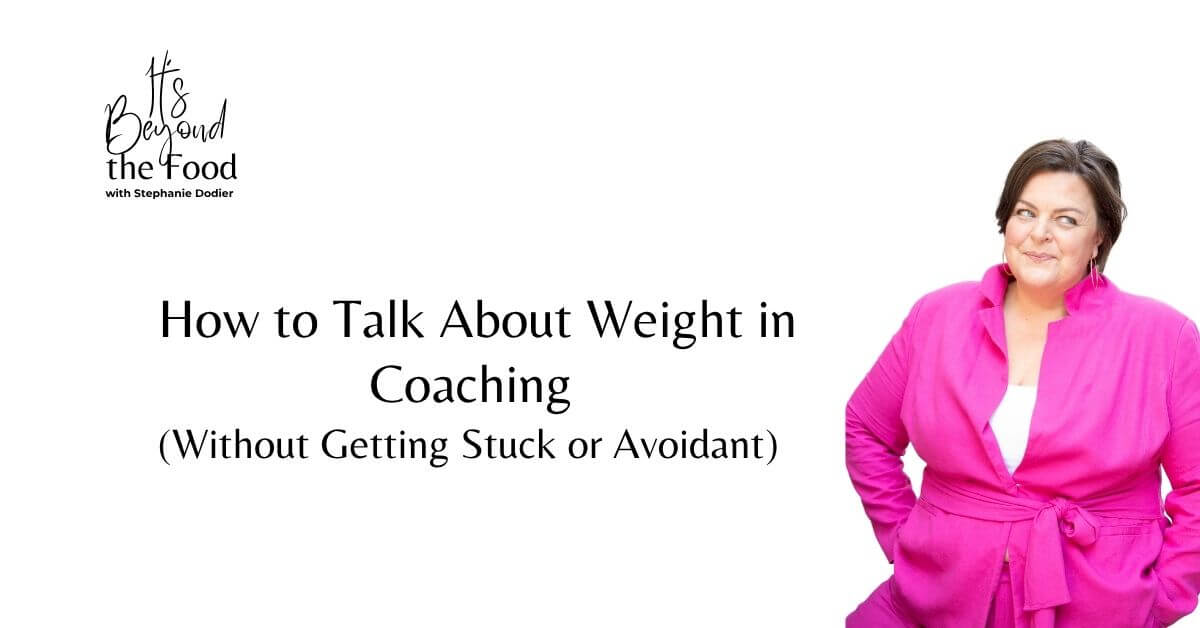

As health coaches committed to a non-diet approach, one of the most challenging conversations we face is when a client says: “But I need to lose weight.” Whether it’s during a consultation or mid-way through a coaching relationship, this statement can trigger fear, avoidance, or a rush to provide research.
Let’s reframe this moment. Instead of dreading the weight conversation in health coaching, let’s see it as an opportunity for deep, transformational work.
Why Talking About Weight Matters in Non-Diet Coaching
Many professionals freeze, intellectualize, or shut down when a client mentions weight. This reaction is normal—but not useful. We cannot guide our clients toward body acceptance and sustainable health if we can’t hold space for their real concerns.
Weight, for most clients, isn’t the problem. It’s the symbol of deeper emotional and social pain—fear of rejection, desire for belonging, or hope for improved health. Our role as coaches is not to convince them otherwise with science but to create space for their truth and gently guide them toward self-discovery.
Rather listen to the audio version of this blog? We’ve got you…
Step 1: Recognize Weight Talk as a Portal, Not a Problem
When clients express concerns about weight—be it weight loss or gain—it’s rarely about the number on the scale. Rather, it’s a surface symptom of deeper discomfort: a desire to feel safe, accepted, healthy, or less judged. The key is recognizing that weight talk is a symbol of underlying emotional, social, or physical distress. Avoiding it only reinforces shame. Instead, lean in.
Coaching isn’t about correcting beliefs with facts. It’s about exploring and unraveling them with empathy.
Step 2: Examine Your Own Relationship With Weight
Before you can effectively coach others through their body image struggles, you must unpack your own. Do weight-related comments from clients trigger discomfort, defensiveness, or judgment in you? That reaction is a cue—not a flaw. It points to areas within yourself that are still healing.
Until you can hold space for your client’s desires without attaching moral value, your nervous system will likely transmit subtle cues of discomfort. And clients are incredibly perceptive.
Step 3: Normalize, Then Get Curious
When a client says, “I need to lose weight,” your role is not to correct or convince, but to inquire. Start by normalizing their experience:
“It makes total sense that you feel this way, given what you’ve been taught about bodies and health.”
Then, dig deeper. Powerful coaching questions help clients uncover the true motives and fears driving their desire for weight change:
What does losing weight mean to you?
What do you believe will change when your body is smaller?
What makes this desire feel urgent right now?
What are you making this weight gain/loss mean about who you are?
These questions do more than gather information—they shift the client from reacting to reflecting.
Step 4: Identify the Real “Why”
As clients unpack their thoughts, patterns emerge. Most often, the weight concern isn’t about weight at all. It’s about:
Wanting to feel confident in public
Fear of rejection or not being loved
A need to avoid illness or reverse chronic symptoms
Pressure from medical providers or family
Wanting to reclaim energy and vitality
Weight becomes a scapegoat for these fears, because diet culture has conditioned us to believe it is the root of all suffering—and that changing our body is the solution.
Step 5: Lead with Compassion, Not Correction
Once the deeper drivers are revealed, mirror them back. Not as a rebuttal, but as recognition:
“If I’m hearing you correctly, it sounds like the desire to lose weight is really about wanting to feel in control of your health and avoid judgment from others.”
This is your opening to gently introduce new perspectives—around health at every size, intuitive eating, and body neutrality—without invalidating the client’s lived experience. This isn’t about preaching. It’s about offering an alternative lens.
Step 6: Explore the Pattern, Not Just the Problem
Rather than trying to change the client’s mind, guide them through examining past attempts:
When was the last time you successfully lost weight?
How did you do it?
Did it last?
Did you enjoy the process?
This helps clients see their own patterns and gently question whether weight loss is truly the solution—or just a familiar cycle with predictable disappointment.
From here, you can offer a radical alternative:
“What if you could feel more confident, energized, and in control—without having to change your body?”
This reclaims the conversation and offers clients a sense of possibility they may not have considered.
Embracing the Discomfort to Facilitate Change
The weight conversation in health coaching is not a detour—it’s the work. Holding space for clients’ weight concerns with empathy, curiosity, and skill allows for true transformation. When clients feel seen and heard—not shamed or dismissed—they’re far more open to shifting perspective. If you’d like to see how I facilitate this conversation, I created this guide: What To Say When Clients Want to Lose Weight.
This framework doesn’t eliminate discomfort. But it equips coaches to move through it with grace, purpose, and confidence. In doing so, we not only support our clients’ healing—we deepen our own.
Need Help with Weight Conversation in Health Coaching?
You can access all of our services on our work with us page. We have a number of programs and service levels enabling us to serve most women:
Free Resources and Masterclasses: Get started and get to know us better!
Private coaching with Stephanie and her team Stephanie and her team of Certified Non-Diet Coaches are waiting to support you in a one-to-one setting with an individualized plan.
Non-Diet Coaching Certification for professionals ready to integrate the Going Beyond The Food Method™️ in their practice and for women wanting to become Certified Coach and build a business coaching other women beyond the food.
How to Say NO to New Year New You and What to Do Instead to Feel Better
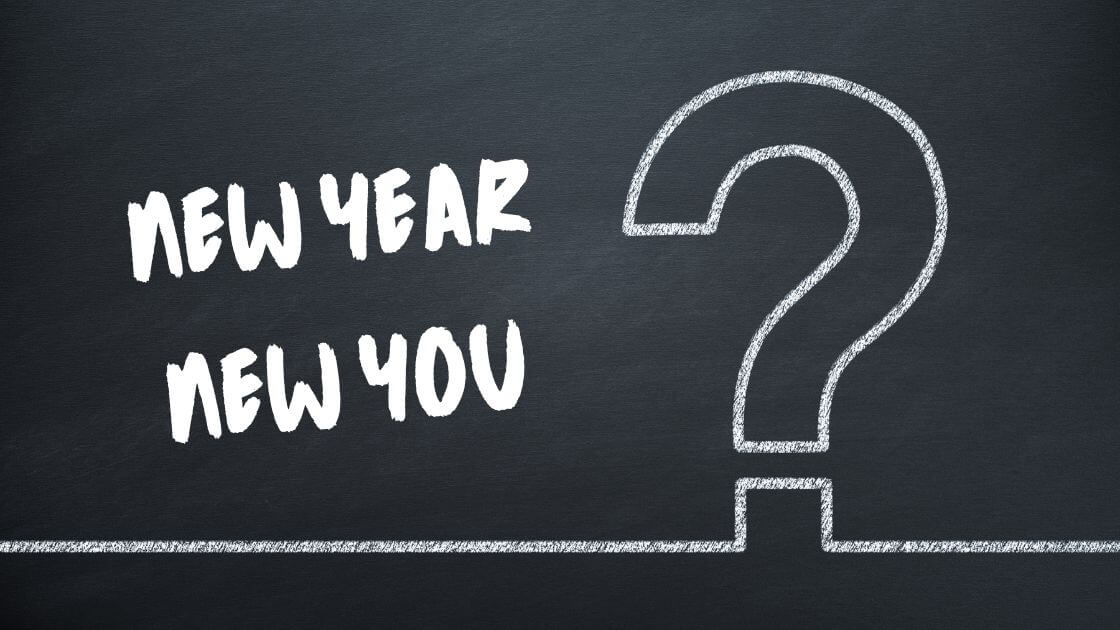

As the year comes to a close, the “New Year, New You” messaging emerges like clockwork, urging us to start over, fix ourselves, and chase unattainable ideals. But what if this year, instead of buying into diet culture’s manipulative narrative, we approached the New Year differently? Ready to learn how to say NO to new year new you narrative?
This guide will help you understand the roots of New Year’s resolutions, how diet culture has distorted them, and how to set empowering goals that support your well-being—without the baggage of dieting or body shame.
The History of New Year’s Resolutions
Setting intentions for the new year is an ancient practice. Four thousand years ago, early civilizations made promises to their gods, offering sacrifices in exchange for a fruitful year ahead. Organized religions later adopted similar traditions, with followers vowing to correct past mistakes and strive for better adherence to religious principles.
In today’s secular world, the “gods” have changed. Diet culture and the thin ideal have replaced spiritual guidance, convincing us that a smaller body is the key to happiness, success, and health. Instead of reflecting on meaningful growth, we’ve been conditioned to focus on shrinking ourselves as the ultimate resolution.
How to Say NO to New Year New You: How Diet Culture Hijacked the New Year
Diet culture preys on insecurities, turning the New Year into a season of self-criticism. It equates worth with physical appearance and health with thinness, pushing the narrative that “fixing” our bodies will fix our lives.
Think about the ads flooding your feed:
- Detoxes to “cleanse” the indulgences of the holiday season.
- Gym promotions promising a “new you.”
- Before-and-after photos celebrating dramatic weight loss.
These messages imply that who you are right now isn’t enough. They frame the New Year as a deadline for transformation, rather than an opportunity for authentic growth.
Rather listen to the audio version of this blog? We’ve got you…
Why We Keep Falling for It
Despite knowing diets don’t work long-term, many of us still set weight loss resolutions. Why? Because diet culture convinces us that failure is personal—not systemic.
When a diet fails, we’re told it’s due to a lack of willpower, not because the diet itself was unsustainable. This endless cycle of blame and guilt keeps us hooked, hoping that the next plan will finally work.
Breaking Free: How to Say NO to New Year New You
Rejecting the New Year, New You narrative isn’t about giving up on self-improvement—it’s about redefining what improvement looks like. Here’s how:
1. Understand What You’re Really Chasing
When you set a weight loss goal, what are you truly seeking? Confidence? Happiness? Better health?
Reframe It: Instead of focusing on a smaller body, focus on how you want to feel. For example, aim for more energy, better sleep, or less stress—none of which require dieting.
2. Separate Health from Weight
Health and weight are not the same. Research shows that behaviors like balanced nutrition, regular movement, and stress management have a greater impact on health than body size.
Reframe It: Set health goals that prioritize behaviors, not outcomes. For example:
- “I’ll add more vegetables to my meals” instead of “I’ll lose 10 pounds.”
- “I’ll take walks for mental clarity” instead of “I’ll burn calories.”
3. Question the “Fix Yourself” Mentality
Diet culture thrives on making you feel broken. But you’re not.
Reframe It: Shift your focus from fixing to creating. What can you build in your life that aligns with your values and brings joy?
4. Ditch All-or-Nothing Thinking
New Year’s resolutions often set us up for failure with extreme, unsustainable goals.
Reframe It: Embrace flexibility. Allow room for adjustments and celebrate small victories along the way.
5. Surround Yourself with Support
Who you follow and engage with shapes your mindset.
Reframe It: Curate your social media to include accounts that celebrate body diversity and reject diet culture. Connect with communities that support intuitive eating and self-compassion.
6. Celebrate Non-Scale Victories
Your worth isn’t defined by a number on the scale.
Reframe It: Recognize achievements that reflect personal growth, like improved energy, stronger relationships, or newfound hobbies.
7. Focus on What Brings Joy
Diet culture thrives on restriction, but joy is essential for a fulfilling life.
Reframe It: Ask yourself, “What lights me up?” Incorporate more of those activities into your daily routine, whether it’s dancing, painting, or spending time with loved ones.
8. Practice Self-Compassion
Self-improvement doesn’t have to be fueled by criticism.
Reframe It: Treat yourself with the same kindness you’d offer a friend. Acknowledge your progress and forgive setbacks.
What to Do Instead of Dieting
Now that you’ve said NO to New Year New You, what’s next? Here’s how to set meaningful, diet-free resolutions:
1. Reflect on Your Values: Identify what truly matters to you. Is it family, creativity, health, or adventure?
2. Set Intentions, Not Rules: Choose intentions that align with your values, like “prioritize rest” or “nurture my creativity.”
3. Break Goals into Steps: Focus on small, actionable changes. Instead of “be healthier,” try “drink more water” or “take deep breaths during stressful moments.”
4. Celebrate Progress: Track how you feel as you make changes. Progress is about growth, not perfection.
How to Say NO to New Year New You: A Radical Proposition
What if, instead of criticizing ourselves, we spent the year learning to believe in ourselves? Imagine redirecting the energy used to shrink your body toward building self-trust, confidence, and joy.
Here’s your challenge for the New Year: Stop measuring yourself against the impossible standards of diet culture. Start creating a life where you feel free, empowered, and unapologetically yourself.
This year, say NO to New Year New You—and YES to the real you.
How We Can Help You Say NO to New Year New You
You can access all of our services on our work with us page. We have a number of programs and service levels enabling us to serve most women:
Free Resources and Masterclasses: Get started and get to know us better!
Private coaching with Stephanie and her team Stephanie and her team of Certified Non-Diet Coaches are waiting to support you in a one-to-one setting with an individualized plan.
Non-Diet Coaching Certification for professionals ready to integrate the Going Beyond The Food Method™️ in their practice and for women wanting to become Certified Coach and build a business coaching other women beyond the food.
Health Goals Versus Weight Loss Goals: Why It’s Not the Same
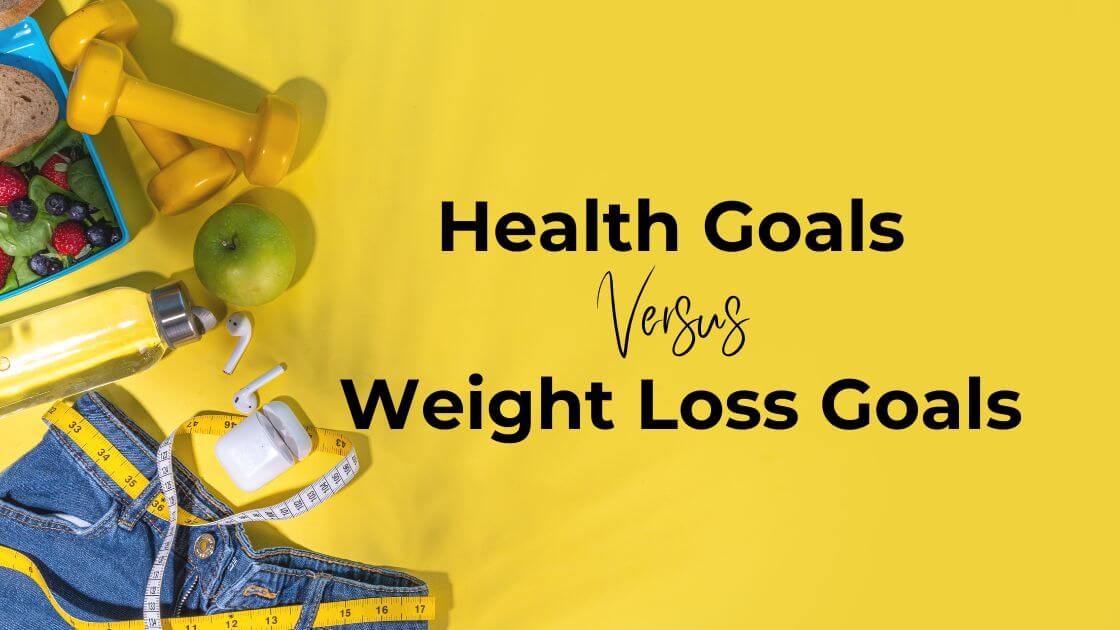

As the end of the year approaches, many of us reflect on the past and set goals for the future. Unfortunately, in a society dominated by diet culture, this time of self-reflection often becomes a season of weight loss resolutions. Ads flood our screens with promises of quick fixes, “detoxes,” and ways to shed holiday pounds. But are weight loss goals the same as health goals? Spoiler: They’re not.
Let’s explore why this distinction matters and how to pursue sustainable health goals that empower you for life.
Health Goals Versus Weight Loss Goals: The Diet Culture Trap
In a world steeped in diet culture, weight loss is often presented as the ultimate solution to health concerns. Feeling tired? Lose weight. Joint pain? Drop pounds. High cholesterol? Slim down.
But weight loss as a universal remedy is misleading and harmful. The association between weight and health is far more complex than what mainstream messaging suggests. For decades, we’ve been conditioned to believe that thinness equals health, happiness, and worth. However, this belief isn’t rooted in science—it’s rooted in societal biases like sexism, racism, and fatphobia.
The Historical Roots of Weight Loss Obsession
Up until the early 20th century, weight loss was not linked to health by medical professionals. The cultural obsession with thinness began in the post-World War era, when societal beauty standards shifted. As Sabrina Strings, author of Fearing the Black Body, explains, fatphobia is tied to white supremacy and religious morality. Thinness became a marker of racial, moral, and national superiority, while fatness was stigmatized as undesirable and sinful.
Patriarchy also fueled this obsession. During times when women fought for more power—like the right to vote or equal pay—cultural narratives about beauty intensified. Thinness became a tool of oppression, keeping women preoccupied with their bodies instead of pursuing autonomy and influence.
As Naomi Wolf writes in The Beauty Myth:
“A cultural fixation on female thinness is not an obsession about female beauty but an obsession about female obedience.”
Rather listen to the audio version of this blog? We’ve got you…
Why Wanting to Lose Weight Feels Normal
If you’ve ever set a weight loss goal, you’re not alone. It’s natural to desire weight loss in a world that constantly reinforces this message. Diet culture surrounds us, from the media to healthcare, shaping our beliefs and behaviors.
When clients like Julie (a fictional example) come to me wanting to lose weight, I validate their feelings. Their desires are a logical response to a lifetime of societal conditioning. But when we dig deeper, the reasons for their weight loss goals often center on improving their health, comfort, or quality of life—goals that don’t actually require weight loss.
Health Goals versus Weight Loss Goals
Here’s the critical distinction:
- Weight loss goals focus on changing your body size.
- Health goals focus on improving how you feel and function.
These two are not the same. In fact, pursuing weight loss can undermine genuine health goals by promoting restrictive diets, disordered eating, and a negative relationship with your body.
The assumption that weight directly correlates with health is flawed. Research consistently shows that health behaviors—like eating nutritious foods, moving your body, and managing stress—have a far greater impact on health than weight alone.
For example, a 2016 study published in the International Journal of Obesity found that nearly 47% of people classified as overweight and 29% of those classified as obese were metabolically healthy. Meanwhile, 31% of those with a “normal” BMI were metabolically unhealthy. This highlights that weight is not a definitive indicator of health.
Redefining Health: A Holistic Approach
Health isn’t just physical. The World Health Organization defines health as:
“A state of complete physical, mental, and social well-being, not merely the absence of disease or infirmity.”
True health encompasses:
1. Physical well-being: Feeling energized and comfortable in your body.
2. Emotional well-being: Managing stress, emotions, and mental health.
3. Social well-being: Maintaining fulfilling relationships and a sense of community.
How to Pursue Health Without Diet Culture
1. Set Non-Weight-Related Goals
Focus on goals like improving sleep quality, increasing energy, or building strength. These are sustainable and have a direct impact on well-being.
2. Adopt a Weight-Neutral Approach
Embrace the idea that health is not determined by the number on a scale. A weight-neutral approach emphasizes behaviors over outcomes.
3. Prioritize Self-Care
Invest in habits that nourish your body and mind, like balanced meals, enjoyable movement, and mindfulness practices.
4. Reject All-or-Nothing Thinking
Health isn’t about perfection. Small, consistent changes matter more than extreme overhauls.
5. Educate Yourself About Diet Culture
Learn how diet culture manipulates societal norms and reinforces harmful ideals. Knowledge is power.
6. Find Joy in Movement
Exercise should feel good, not like a punishment. Experiment with activities that bring you joy, whether it’s dancing, yoga, or hiking.
7. Manage Stress and Rest
Chronic stress takes a toll on health. Incorporate relaxation techniques and prioritize sufficient sleep.
8. Surround Yourself with Support
Seek out communities that celebrate body diversity and reject diet culture. Curate your social media to reflect these values.
9. Develop Self-Compassion
Be kind to yourself as you unlearn harmful narratives. Accept that your journey will involve ups and downs.
10. Celebrate Non-Scale Victories
Track progress in ways that reflect your overall well-being, like improved stamina, better mood, or reduced stress levels.
Health Goals Versus Weight Loss Goals: The Empowering Choice
Silencing the noise of diet culture and choosing health goals over weight loss goals is an act of self-empowerment. It’s about shifting the focus from shrinking your body to living your fullest, healthiest life.
Remember, your worth is not determined by your weight. By prioritizing sustainable health goals, you can nurture a positive relationship with your body and create a life that supports your well-being in every sense.
Your body, your choice. Choose health, not weight loss.
Need help pursuing your health goals?
You can access all of our services on our work with us page. We have a number of programs and service levels enabling us to serve most women:
Free Resources and Masterclasses: Get started and get to know us better!
Private coaching with Stephanie and her team Stephanie and her team of Certified Non-Diet Coaches are waiting to support you in a one-to-one setting with an individualized plan.
Non-Diet Coaching Certification for professionals ready to integrate the Going Beyond The Food Method™️ in their practice and for women wanting to become Certified Coach and build a business coaching other women beyond the food.
10 Tips for Silencing the Weight Loss Message During the Holidays


The holidays should be a time of joy, connection, and celebration, but for many, it’s also when the weight loss industry ramps up its messaging. From detox ads to fitness challenges disguised as New Year’s resolutions, these messages can overshadow the true spirit of the season, leaving you feeling unworthy or pressured to conform.
But you don’t have to listen. Silencing the weight loss message is about reclaiming your holiday experience and prioritizing your mental and emotional well-being over the noise of diet culture.
Here are 10 empowering tips to help you navigate the holidays while tuning out harmful weight loss messages.
1. Anticipate and Prepare for Weight Loss Messaging
Weight loss ads and campaigns flood the holiday season. From social media posts to commercials, these messages are everywhere, aiming to profit from your insecurities.
Tip: Anticipate this surge and decide how to respond. Mute accounts, skip triggering conversations, or prepare mantras like, “This message doesn’t define me.”
2. Understand the Systemic Fear of Fatness
The weight loss industry thrives on the fear of fatness, a belief ingrained in us by societal norms. Recognizing this fear as a learned bias is the first step toward dismantling its power.
Tip: Reflect on how societal pressures have shaped your views about weight and body image. Acknowledge that these fears are not your fault.
3. Follow the Money Trail
The weight loss, beauty, and wellness industries profit billions annually by pushing these messages. Remember, they aren’t invested in your health or happiness—they’re invested in their bottom line.
Tip: When you see a weight loss ad, remind yourself it’s designed to sell, not serve. This awareness can help you detach from its emotional impact.
4. Acknowledge Fatphobia as a Systemic Issue
Fatphobia isn’t just a personal issue—it’s systemic. It’s woven into media, healthcare, and social norms, perpetuating the belief that thinner is better.
Tip: Educate yourself on systemic fatphobia. Understanding its roots can empower you to resist its influence in your own life.
5. Learn the Language of Diet Culture
Silencing the weight loss message requires understanding the broader system of diet culture. This culture places value on thinness, equating it with health and morality, and keeps people preoccupied with their bodies.
Tip: Dive into resources that define and challenge diet culture. Learning its patterns can help you recognize and reject its influence.
Rather listen to the audio version of this blog? We’ve got you…
6. Be Compassionate with Yourself
It’s natural to feel the urge to lose weight in a world obsessed with thinness. However, acting on these feelings isn’t necessary.
Tip: Practice self-compassion. Acknowledge these feelings without judgment and remind yourself that your worth is not tied to your weight.
7. Curate Your Social Media Feed
The messages you surround yourself with matter. Social media can be a source of empowerment or a breeding ground for comparison and insecurity.
Tip: Unfollow accounts that promote weight loss or unrealistic beauty standards. Instead, follow creators who celebrate body diversity and self-acceptance.
8. Remember: You Don’t Owe Anyone an Explanation
Your body and choices are yours alone. You’re not obligated to explain your appearance, eating habits, or health goals to anyone.
Tip: Use affirmations like, “My body, my rules,” to reinforce your autonomy. Let go of the need to please others with your personal decisions.
9. Set Intentions from a Place of Love
When setting goals or intentions for the New Year, let them come from a place of love and self-respect, not fear or self-criticism.
Tip: Ask yourself, “What would I pursue if I believed I was already enough?” Use this as your guiding principle for decision-making.
10. Use Triggers as Opportunities for Growth
Avoiding weight loss messaging entirely isn’t realistic, but you can use these moments as chances to reflect and heal.
Tip: When triggered, pause and ask yourself, “What belief is being challenged here?” Use the experience to identify areas where you can grow and strengthen your mindset.
Silencing the Weight Loss Message: The Path to True Freedom
Silencing the weight loss message during the holidays isn’t just about avoiding negativity—it’s about embracing joy, connection, and self-worth. By following these tips, you can create a season that prioritizes your well-being over societal pressures.
Remember, the holidays are a time to celebrate the fullness of life, not shrink yourself to fit someone else’s ideals. This year, tune out the noise, choose self-love, and reclaim the holiday season for what it truly is: a time to cherish yourself and your loved ones.
Need help silencing the weight loss message to break free from diet culture?
You can access all of our services on our work with us page. We have a number of programs and service levels enabling us to serve most women:
Free Resources and Masterclasses: Get started and get to know us better!
Private coaching with Stephanie and her team Stephanie and her team of Certified Non-Diet Coaches are waiting to support you in a one-to-one setting with an individualized plan.
Non-Diet Coaching Certification for professionals ready to integrate the Going Beyond The Food Method™️ in their practice and for women wanting to become Certified Coach and build a business coaching other women beyond the food.
Navigating Diet Talks and Comments about Weight & Body


A Guide for Women
In a world preoccupied with appearance and weight, navigating diet culture and unsolicited body commentary can be challenging. Many women face these conversations in social, family, and professional settings, making it essential to develop strategies to maintain self-confidence and emotional well-being. This guide offers insights into understanding diet culture, managing emotional triggers, and setting boundaries to foster empowerment.
Understanding the Context of Diet Talks and Body Comments
The Pervasiveness of Diet Culture
Diet culture is a societal framework that equates thinness with health, morality, and success. This narrative often influences conversations about weight, food, and bodies, leaving many unaware of its insidious effects. Women, particularly, are often targeted, expected to conform to unrealistic body standards shaped by patriarchal norms.
Recognizing the systemic nature of diet culture can help shift perspectives. The comments you hear or the comparisons you make are products of a deeply ingrained belief system, not personal truths.
Rather listen to the audio version of this blog? We’ve got you…
Preparing for Diet and Body Discussions
Anticipate the Conversations
Diet-related discussions tend to surface during holidays, family gatherings, and even casual meet-ups. Rather than being caught off guard, anticipate these topics and prepare mentally. Understand that people may not have the same awareness of diet culture as you do, and many speak from a place of conformity rather than intent to harm.
Mindset Shift: View these interactions as predictable events rather than personal attacks. This reframing can lessen their emotional impact.
Managing Emotional Reactions to Body Comments
Recognizing the Source of Your Emotions
Emotional responses to body-related comments often stem from internalized beliefs rather than the words themselves. For instance, a remark about weight gain might trigger self-doubt because it aligns with existing insecurities. However, these emotions are self-generated by how we interpret others’ words.
Actionable Step: Pause when faced with triggering comments. Ask yourself, “What belief am I holding onto that makes this comment hurtful?” This reflection redirects focus to your own empowerment.
Cultivating Compassion for Yourself and Others
For Yourself
Acknowledge that reacting emotionally to body commentary is a conditioned response shaped by years of exposure to diet culture. Practice self-compassion by reminding yourself that these feelings are normal but can be reprogrammed over time.
intentional Thought: “I am more than my body. My worth is not defined by societal standards.”
For Others
Understand that those engaging in diet talk or commenting on bodies often operate from their own insecurities and limited understanding. Extend compassion, knowing they might not yet realize the harm of their words.
Establishing and Maintaining Boundaries
Internal Boundaries
Internal boundaries involve controlling your reactions and emotions. When encountering diet talk, remind yourself that these opinions are not reflections of your value. Mentally disengage from conversations that don’t align with your beliefs.
External Boundaries
External boundaries require clear communication. Examples include:
- “I prefer not to discuss my body or weight.”
- “Let’s talk about something other than dieting or weight loss.”
- “I am focusing on a healthy relationship with food, and diet culture doesn’t align with that.”
If a conversation continues to infringe upon your comfort, physically remove yourself from the situation when possible.
Reprogramming Internal Beliefs for Long-Term Resilience
The Role of Self-Coaching
Self-coaching is a powerful tool to reshape the beliefs ingrained by diet culture. Start by identifying thoughts that no longer serve you. For example:
- Replace “I need to lose weight to be healthy” with “Health is about habits, not size.”
- Replace “She looks better than me” with “We all have unique bodies that serve us differently.”
Practicing these shifts regularly can rewire thought patterns, reducing the impact of external comments.
Practical Steps for Everyday Situations
- Create Intentional Thoughts: Before attending gatherings, prepare affirming thoughts. For instance:
- “Comments about my body reflect their beliefs, not my worth.”
- “My body is not a topic of public discussion.”
- Develop a Go-To Response: Having a polite yet firm reply ready can defuse awkward moments. For example:
- “Thank you for your concern, but I’m focusing on a holistic approach to my health.”
- Engage in Supportive Communities: Surround yourself with people who respect and celebrate bodies of all shapes and sizes. Online groups or in-person communities can offer encouragement and validation.
The Power of Compassionate Boundaries
Setting boundaries isn’t about controlling others; it’s about protecting your energy and emotional well-being. While some may find this assertiveness surprising, over time, it fosters healthier relationships where mutual respect is prioritized.
Remember: Setting boundaries is a form of self-respect and empowerment.
Final Thoughts: Taking Responsibility for Your Journey
Ultimately, the power to navigate diet talks and body comments lies within. You cannot change others, but you can control how you respond. By shifting your beliefs, preparing for interactions, and setting compassionate boundaries, you reclaim your narrative and define your worth independently of societal standards.
As you embark on this journey, be patient and kind to yourself. Transforming your mindset takes time, but the freedom it brings is invaluable. You are more than your body. Embrace the full, authentic version of yourself.
Ready to Explore this Further?
You can access all of our services on our work with us page. We have a number of programs and service levels enabling us to serve most women:
Free Resources and Masterclasses: Get started and get to know us better!
Private coaching with Stephanie and her team Stephanie and her team of Certified Non-Diet Coaches are waiting to support you in a one-to-one setting with an individualized plan.
Non-Diet Coaching Certification for professionals ready to integrate the Going Beyond The Food Method™️ in their practice and for women wanting to become Certified Coach and build a business coaching other women beyond the food.
BMI Health and the Anti-Diet Health Approach
BMI, Health and the Anti-Diet Health Approach: A New Perspective
Are you tired of the endless cycle of dieting and weight obsession? You’re not alone. As a society, we’ve been conditioned to believe that our health is directly tied to our weight and Body Mass Index (BMI). But what if I told you that this approach is not only unsustainable but potentially harmful?
The Tyranny of Diet Culture
Let’s start with some eye-opening statistics:
– By age 45, the average woman has tried 61 different diets.
– Women spend an equivalent of 31 years obsessing about changing their bodies.
– Only 4% of women in first-world countries consider themselves ‘beautiful.’
– 75% of women report attempting to control their weight through dieting.
– 95% of diets fail, with dieters regaining lost weight within 1-5 years.
Perhaps most alarmingly, almost half of American girls between 1st and 3rd grade want to be thinner. 50% of 9-10-year-old girls are already dieting.
These facts paint a clear picture: we’re not free. We’re oppressed by diet culture.
The Historical Context of BMI and Health
You might assume that the link between health and weight has always existed. But the truth is quite different.
The Origins of BMI
The BMI was invented in the early 1800s by a mathematician. Surprisingly, it had nothing to do with health. It was created to determine the “ideal” body for a white European elite male of that era.
Read more about the history of BMI here.
The Shift in Medical Advice
Up until the 1930s, weight loss was never part of physician advice or public health guidelines. The association between weight loss and health only emerged in the post-World War II era. This shift coincided with the rise of diet culture and the idealization of thin bodies.
It’s crucial to understand that health and weight loss became associated not because of scientific evidence, but because culture had created a desire for thinness and a disdain for larger bodies.
BMI: A Flawed Measure of Health
Despite its widespread use, the BMI is a poor indicator of overall health.
The UCLA Study
A 2016 study by researchers at UCLA examined 40,420 American adults, assessing their health through six accepted metrics:
1. Blood pressure
2. Triglycerides
3. Cholesterol
4. Glucose
5. Insulin resistance
6. C-reactive protein (inflammation marker)
The results were surprising:
– 47% of people classified as overweight by BMI were healthy.
– 29% of those qualified as obese were healthy.
– 31% of normal-weight people were unhealthy.
The researchers concluded: “Policymakers should consider the unintended consequences of relying solely on BMI, and researchers should seek to improve diagnostic tools related to weight and cardiometabolic health.”
BMI, Health and the Anti-Diet Health Approach: The Truth About Our Desire to Be Thin
Our societal obsession with thinness isn’t rooted in health outcomes. Instead, it’s deeply intertwined with sexism and racism.
As Sabrina Strings, Ph.D., author of “Fearing the Black Body,” explains, two critical historical developments contributed to the fetishization of thinness:
1. The transatlantic slave trade
2. The spread of Protestantism
In the United States, fatness became stigmatized as both “black” and “sinful.” Slenderness served as a marker of moral, racial, and national superiority.
Read more about Feminism and Diet Culture here
The Evolution of Beauty Standards and Female Oppression
Throughout history, changing beauty ideals have been used as a tool to keep women focused on their bodies and away from pursuing power.
– 1890s: The Gibson Girl ideal emerged as women began to demand more power.
– 1920s: The Flapper Girl coincided with women’s fight for political power and the right to vote.
– 1970s: Twiggy’s ultra-thin look appeared as women demanded equal work and equal pay.
As Naomi Wolf states in “The Beauty Myth”: “A cultural fixation on female thinness is not an obsession about female beauty but an obsession about female obedience… Dieting is the most potent political sedative in women’s history; a quietly mad population is a tractable one.“
The Solution: Health Beyond Dieting
As you become more educated about the non-diet approach to health, you must become comfortable with the fact that health isn’t measurable in one gold standard. It’s time to embrace a new approach to health—one that doesn’t revolve around weight loss or BMI.
The Weight-Neutral Approach to Health
A weight-neutral approach recognizes that health status can’t be determined solely by weight. It acknowledges that weight is influenced by complex factors, many of which are difficult or impossible to change.
This approach focuses on factors within your control:
– Thoughts
– Emotions
– Behaviors
By addressing these elements, you can improve your well-being and health, regardless of your weight.
The Four Bodies of Health
Humans are more than just physical bodies needing nutrition. We are composed of four interconnected bodies:
1. Emotional body: Needs emotional wellness
2. Mental body: Requires mental balance
3. Spiritual body: Craves connection and faith
4. Physical body: Needs proper nutrition and movement
True health is the sum of all four bodies’ well-being.
Embracing the Anti-Diet Health Approach
Transitioning to an anti-diet approach can be scary for both professionals and individuals. But it’s a crucial step towards true health and well-being.
If you’re ready to explore this approach further, I’d like to invite you to a training I delivered a few months ago, “How to coach weight-neutral health.” This is how we approach health within the Going Beyond the Food Method™️.
I have also written an in-depth article on various tactics to support your Health Beyond Dieting; you can read here.
Conclusion: BMI, Health and the Anti-Diet Health Approach
It’s time to move beyond BMI and weight-centric approaches to health. By embracing a weight-neutral, holistic view of well-being, we can break free from the cycle of dieting and truly thrive.
Remember, your worth is not determined by your weight or your BMI. You are so much more than a number on a scale. It’s time to reclaim your health, your happiness, and your power.
Are you ready to start your journey towards true health beyond dieting?
You can access all of our services on our work with us page. We have a number of programs and service levels enabling us to serve most women:
Free Resources and Masterclasses: Get started and get to know us better!
Private coaching with Stephanie and her team Stephanie and her team of Certified Non-Diet Coaches are waiting to support you in a one-to-one setting with an individualized plan.
Non-Diet Coaching Certification for professionals ready to integrate the Going Beyond The Food Method™️ in their practice and for women wanting to become Certified Coach and build a business coaching other women beyond the food.
Weight Stigma Is The Real Problem
In the world of health and nutrition, many professionals focus on diet plans, exercise regimens, and the number on the scale. However, as advocates of the non-diet approach, we understand that there’s a more insidious issue that deserves our attention: weight stigma. The real culprit behind disordered eating behaviors, restrictive eating, and diet cycling isn’t a lack of nutritional knowledge; it’s weight stigma. As health professionals, it’s crucial to understand that weight stigma, not weight itself, is often the root cause of many health issues we encounter in our practices. Let’s explore why weight stigma is the real problem and how we can address it through a non-diet lens.
What Is Weight Stigma?
Weight stigma, also known as weight bias, sizism, or fatphobia, refers to negative attitudes and beliefs about people because of their weight. It’s the labeling of individuals with stereotypes based on their body size. Unfortunately, there’s a common misconception that weight stigma (or fat-shaming) will motivate people to change their behaviors. However, research clearly shows this isn’t true.
Types of Weight Bias
Weight bias can manifest in two primary forms:
1. Explicit or conscious bias: When a person recognizes they have negative attitudes towards people living with obesity.
2. Implicit or unconscious bias: When a person is unaware of their attitudes but treats or talks about a person living with obesity differently than someone with a lower body weight.
The Scope of the Weight Stigma Problem
Weight stigma is more prevalent than you might think. Over 40% of U.S. adults, across various body sizes, report experiencing weight stigma at some point in their lives. Globally, the numbers are even higher. A 2018 World Obesity Federation poll found that 62% of UK residents believed overweight individuals are likely to face discrimination, surpassing other forms of bias.
Where Does Weight Stigma Occur?
Weight stigma is deeply embedded in our society, making it challenging to avoid. It’s prevalent in:
– Media
– Social situations
– Schools and colleges
– Workplaces
– Healthcare settings
A study involving over 2,400 American women found that weight stigma was experienced from various sources:
– 72% from family
– 64% from classmates
– 60% from friends
– 54% from colleagues
– 43% from employers
– 32% from teachers
– 23% from authority figures like police
The Impact of Weight Stigma on Health
Contrary to popular belief, stigmatizing attitudes hinder rather than promote better health outcomes. The effects of weight stigma are far-reaching and significant.
Mental Health Impacts
Research demonstrates that weight stigma negatively impacts mental well-being, leading to:
– Lower self-esteem
– Depression
– Anxiety
– Poor body image
– Higher likelihood of substance abuse
Physical Health Impacts
Weight stigma also affects physical health, correlating with:
– Elevated blood pressure
– Increased levels of C-reactive protein
– Higher cortisol levels
– Increased glycated hemoglobin (HbA1c)
– Higher oxidative stress
Importantly, one study found that individuals who experience weight stigma face a 60% higher risk of premature death, regardless of their BMI.
The Stress Connection
The Cyclic Obesity Weight-Based Stigma (COBWEBS) model suggests that weight stigma induces stress, which raises cortisol levels, increases eating, and ultimately leads to weight gain and obesity. This creates a vicious cycle that’s difficult to break.
Weight Stigma in Healthcare Settings
As health professionals, it’s crucial to recognize that weight stigma is prevalent even in healthcare settings. Research shows that negative attitudes and stereotypes toward those living in larger bodies have been observed among various professionals, including:
– Doctors
– Nurses
– Dietitians
– Psychologists
– Gynecologists
– Eating disorder specialists
– Bariatric care professionals
Breaking the Cycle: Solutions to Weight Stigma
As health professionals, we have a responsibility to end the cycle of discrimination. Here are some steps we can take:
1. Investigate your own weight bias: Take the Harvard Implicit Association Test to uncover your own biases.
2. Reflect on your attitudes and beliefs: Examine your own thoughts and behaviors regarding weight.
3. Enhance your understanding: Learn about the complex interplay of genetic, biological, social, and environmental factors that influence body weight.
4. Develop empathy: Gain insight into the experience of weight stigma from the perspective of patients.
5. Adopt people-first language: Refer to someone as a “person living with obesity” instead of an “obese person.”
6. Speak up: Challenge negative comments about weight or body size when you hear them.
7. Be mindful: Consider how you discuss weight at all times, not just with clients or patients.
The Power of the Non-Diet Approach
As women health practitioners, we have the power to impact thousands of other women. By embracing a non-diet approach, we can lead a grassroots movement to change the world for future generations of women.
If you’re new to the non-diet approach and need support as a professional, consider joining The Non-Diet Coaching Certification. This program helps you perfect your professional skills and build a profitable non-diet business.
Remember, stopping dieting is a revolutionary act. As health professionals, we have the power to change the narrative around weight and health. Let’s work together to create a world free from weight stigma, where all bodies are respected and valued.
Next Steps
You can access all of our services on our work with us page. We have a number of programs and service levels enabling us to serve most women:
Free Resources and Masterclasses: Get started and get to know us better!
Private coaching with Stephanie and her team Stephanie and her team of Certified Non-Diet Coaches are waiting to support you in a one-to-one setting with an individualized plan.
Non-Diet Coaching Certification for professionals ready to integrate the Going Beyond The Food Method™️ in their practice and for women wanting to become Certified Coach and build a business coaching other women beyond the food.
The Secret to Achieving a Health Goal for Women
The Secret to Achieving a Health Goal for Women
As women, we’re often bombarded with messages about self-improvement and the need to “fix” ourselves. This constant pressure can make setting and achieving health goals feel daunting, especially when we’ve been conditioned by diet culture. But what if I told you there’s a better way? A way that empowers you to set health goals without falling into the traps of diet culture and patriarchy? Let’s explore how we can revolutionize our approach to achieving goals as women.
The Diet Culture Dilemma in Goal Setting
Before we dive into the secret of achieving health goals, we need to address the elephant in the room: diet culture. Many of us have been led to believe that an anti-diet approach means abandoning all health goals. This couldn’t be further from the truth.
The real problem isn’t setting health goals; it’s how we think about them. Diet culture has infiltrated our self-concept, affecting how we approach not just food and body image, but also our careers, relationships, and yes, goal setting.
Breaking Free from the “Fix It” Mentality
Society often encourages women to exist in a perpetual state of self-improvement. We’re constantly told what’s wrong with us, with the promise that fixing these “flaws” will lead to happiness and self-confidence. This mindset teaches us to undervalue ourselves and hold ourselves back.
As a result, many women associate goals with reminders of their “not good enoughness.” We see goals as a way to fix our perceived deficiencies, avoid pain, and seek approval. Unsurprisingly, this approach feels terrible and often leads to goal avoidance.
Achieving a Goal for Women: The Liberated Goal-Setting Process
So, how can we set health goals that empower rather than diminish us? The answer lies in the Liberated Goal Setting Process. This approach combines a weight-neutral perspective on health with a fresh take on goal setting. Here are the key components:
1. Constraint: Focus on One Goal at a Time
In our fast-paced world, it’s tempting to pursue multiple goals simultaneously. However, this often leads to overwhelm and burnout. The Liberated Goal Setting Process emphasizes focusing on one goal at a time. This constraint allows you to channel your energy and attention more effectively, increasing your chances of success.
2. Clean: Embrace Imperfect Action
Many women avoid setting goals because they fear they won’t achieve them perfectly. The “clean” aspect of this process involves understanding that the point of a goal is never perfection. Instead, it’s about building the habit of taking consistent, imperfect action toward something you want to create.
3. Courting: Develop a Relationship with Your Goal
Goal-setting isn’t just about the end result; it’s about the journey. The “courting” phase involves developing a deep relationship with your goal. This means learning to trust yourself throughout the process, celebrating small wins, and using setbacks as learning opportunities.
Reframing Health Goals for Women
Now that we understand the Liberated Goal Setting Process let’s explore how to apply it specifically to health goals:
Creating Instead of Fixing
Instead of setting goals to fix perceived flaws, focus on creating something new. Ask yourself: “What do I want to create in my life?” This shift in perspective can transform goal-setting from a draining experience to an exciting opportunity for growth.
Using Goals to Expand Your Self-Concept
View your health goals as containers for acquiring new skills, habits, and ways of thinking. Each goal becomes an opportunity to expand your self-concept and challenge your limitations. As you work towards your goal, pay attention to how you’re growing and changing as a person.
Achieving a Goal for Women: Making Health Goals Safe for Women
Combining the Liberated Goal Setting Process with a weight-neutral approach to health makes setting health goals safe and empowering for women. Here’s how:
1. Choose goals that align with your values, not societal expectations.
2. Focus on behaviors and habits rather than outcomes like weight loss.
3. Celebrate non-scale victories and internal changes.
4. Practice self-compassion throughout the process.
The Power of Self-Belief in Achieving Goals
As women, we often underestimate the importance of believing in ourselves. How much time do you spend convincing yourself that you can be successful? Becoming a woman who decides what she believes in, without seeking permission from others, is a powerful step in achieving your goals.
Coaching Women to Believe in Themselves
If you’re a coach working with women, you have the opportunity to guide them in believing in themselves through their health goals. Help your clients:
1. Identify limiting beliefs that hold them back.
2. Reframe negative self-talk into empowering statements.
3. Visualize success and the person they’ll become through achieving their goals.
4. Develop resilience in the face of setbacks.
Reconciling Health Goals with the Anti-Diet Approach
For those who have embraced the anti-diet approach, it’s important to understand that setting health goals doesn’t contradict these principles. The key is in how you approach those goals:
1. Focus on adding healthy behaviors rather than restricting.
2. Set goals based on how you want to feel, not how you want to look.
3. Prioritize mental and emotional health alongside physical health.
4. Use goals as a tool for self-discovery and growth, not punishment.
Conclusion: Empowering Women Through Goal Setting
Achieving health goals as a woman doesn’t have to be a battle against yourself. By reframing how we think about goals, embracing the Liberated Goal Setting Process, and focusing on creation rather than fixing, we can transform goal-setting into an empowering and exciting journey.
Remember, the secret to achieving a health goal for women lies not in the goal itself, but in how we approach it. By believing in ourselves, embracing imperfection, and viewing goals as opportunities for growth, we can create lasting change that feels authentic and empowering.
Are you ready to revolutionize your approach to health goals? Start by choosing one area of your health you’d like to improve, and apply the principles we’ve discussed. You might be surprised at how different goal-setting can feel when you approach it from a place of self-love and curiosity rather than criticism and fear.
Let’s rewrite the narrative around women’s health goals, one empowered step at a time.
Need help learning how to achieve a health goal? Or Coach others with health?
You can access all of our services on our work with us page. We have a number of programs and service levels enabling us to serve most women:
Free Resources and Masterclasses: Play Bigger: A 4-part Masterclass series to help you learn the process of making Good Money in a way that feels damn good!
Non-Diet Coaching Certification for professionals ready to integrate the Going Beyond The Food Method™️ in their practice and for women wanting to become a Certified Coach and build a business coaching other women beyond the food.
Anti-Diet Training for Health Coaches
One of the frequent questions from health coaches who encounter my work in the non-diet approach for the first time is this:
How do I make money as a non-diet coach?
I get it. I had the same question 6 years ago when I first came to the world of anti-diet health coaching. If we don’t tell people what to eat, when to eat, and how to eat, what will they pay us for? Right?
Clients seeking services from a non-diet health coach have a lot they are willing to pay for: primarily ending their struggle with food and body. Helping them relearning to eat following their own eating cues instead of a “health coach” looking over their shoulder lol! Undoing all the body-shaming that “weight loss coaches” have created within them, being able to trust their own choices when it comes to health, undoing the critical mean girl voices in their head, etc…
The list could go on, but simply: undoing the work of diet culture. That’s how you make money as a non-diet health coach. If you have been through the process of unlearning diet culture yourself, you’ll know exactly what I mean. If you haven’t yet, it’s normal you don’t get it and this is the first place you need to start: doing the work of unlearning diet culture yourself.


Anti-diet training for health coaches
Starting an anti-diet coaching business
What I wish I knew before starting my non-diet health coaching business
The anti-diet approach mentorship program
Anti-diet training for health coaches
The process of becoming an anti-diet health coach starts with your own healing from years of restrictions, cleanses, detoxing, overthinking, shame and guilt. We have plenty of resources on anti-diet training for health coaches to help you take this first step along with professional training.
We have created a number of free non-diet approach training resources to help you begin learning more about this revolutionary health approach. Join my non-diet professional community by requesting our non-diet professional starter pack.
I would suggest you also subscribe to anti-diet podcast .
Starting an anti-diet coaching business
Starting an anti-diet coaching business (also referred to by some as an intuitive eating business is simple. It is the same as starting any other business: You create a product, in the anti-diet health coaching business this would be a coaching package, and you go out into the world and sell this product.
As soon as you start working with clients, you will know just how powerful your product truly is. Research is clear about the benefits of health coaching: Significant improvements in one or more of the health-promoting behaviors when interacting with a health coach. You will see the changes in your clients quickly and your confidence in your business will grow rapidly.


My anti-diet business journey
My first business in the world of health coaching was actually a nutrition clinic in Toronto Canada. Five years ago, I transitioned my health coaching business to the non-diet model and I shared the details of my business transition to the anti-diet model in season 1 of the Pro’s podcast series.
I’d like to give you an inside view into my anti-diet health coaching business more precisely what I wish I knew before starting my anti-diet health coaching business.
As I say in every episode of the Going Beyond The Food podcast: Ready? Let’s do this!
By the way, if you would like to access more details, hear my personal story that created each one of these learning head over to our podcast and listen to Season 2 Episode 2 – My Non-diet business journey episode or listen directly below:
What I wish I knew before starting my non-diet health coaching business
- It’s about helping others, not turning a profit. Profit will come naturally as you help others and live your life in your zone of genius.
- You can make a great living as an anti-diet health coach in a career helping others deeply despite what anyone says.
- 6 P’s: Proper Planning Prevent Piss Poor Performance. You need to be strategic about your business and organize yourself. What you should do is not always what you wish you could do.
- Learn how to coach people. Coaching is not – this is how I did it so that’s the way. What worked for me is not what will work for my client. Coaching is a skill.
- Create goals and apply consistent action. Show up consistently day in and day out in your business. Take one action at bare minimum daily.
- Asking for help is ok. Your client asked for you, so should you.
- Use technology so you can maximize your time being a coach. Technology can help, but don’t forget that health coaching is about the people.
- Trying to be everything to everyone is a straight road to failure. Pick a niche and become the world expert at it.
- Growing a business is not linear. There will be more downs than ups. Successful businesses don’t happen overnight. It takes time.
- Be unapologetically YOU. Don’t copy what other non-diet coaches are doing. Your clients want to work with you.
The anti-diet approach certification program
The Non-Diet Coaching Certification is a space where you can receive support guidance to become the best non-diet professional. It’s a program geared to refine your non-diet professional skills set and teach you the skills you need to build a successful business that can impact thousands of women. It will help you develop as a powerful leader and help other women come back to their power. You will learn how to harness your ability to support and help other women. As a result, you can impact thousands of other women and dismantle diet culture.
Anti-diet training for health coaches
We have created a number of free non-diet approach training resources to help you begin learning more about this revolutionary health approach. Join my non-diet professional community by requesting our non-diet professional starter pack.
I would suggest you also subscribe to anti-diet podcast and start with episode 199 and follow through up to the latest one.
Starting an anti-diet coaching business
Starting an anti-diet coaching business (also referred to by some as an intuitive eating business) is simple. It is the same as starting any other business: You create a product, in the anti-diet health coaching business this would be a coaching package, and you go out into the world and sell this product.
My anti-diet business journey
My first business in the world of health coaching was actually a nutrition clinic in Toronto Canada. Five years ago, I transitioned my health coaching business to the non-diet model and I shared the details of my business transition to the anti-diet model in season 1 of the Pro’s podcast series.
What I wish I knew before starting my non-diet health coaching business
1. It’s about helping others, not turning a profit.
2. You can make a great living as an anti-diet health coach.
3. 6 P’s: Proper Planning Prevent Piss Poor Performance.
4. Learn how to coach people.
5. Create goals and apply consistent action.
6. Asking for help is ok.
7. Use technology so you can maximize your time being a coach.
8. Trying to be everything to everyone is a straight road to failure.
9. Growing a business is not linear.
10. Be unapologetically YOU.
Ready to take the next steps
The anti-diet approach mentorship program
You can access all of our services on our work with us page. We have a number of programs and service levels enabling us to serve most women:
Free Resources and Masterclasses: Get started and get to know us better!
Private coaching with Stephanie and her team Stephanie and her team of Certified Non-Diet Coaches are waiting to support you in a one-to-one setting with an individualized plan.
Undiet Your Life group coaching program is for women to learn how to eat intuitively, become body neutral, and learn self-coaching at their own pace while being supported in a group setting by Stephanie and her team of Certified Non-Diet Coaches.
Non-Diet Coaching Certification for professionals ready to integrate the Going Beyond The Food Method™️ in their practice and for women wanting to become Certified Coach and build a business coaching other women beyond the food.
Good Money Business Mastermind A business mentorship and a collective of ambitious, driven and empowered anti-diet culture providers and coaches on a mission to dismantle diet culture and make GOOD money doing it!
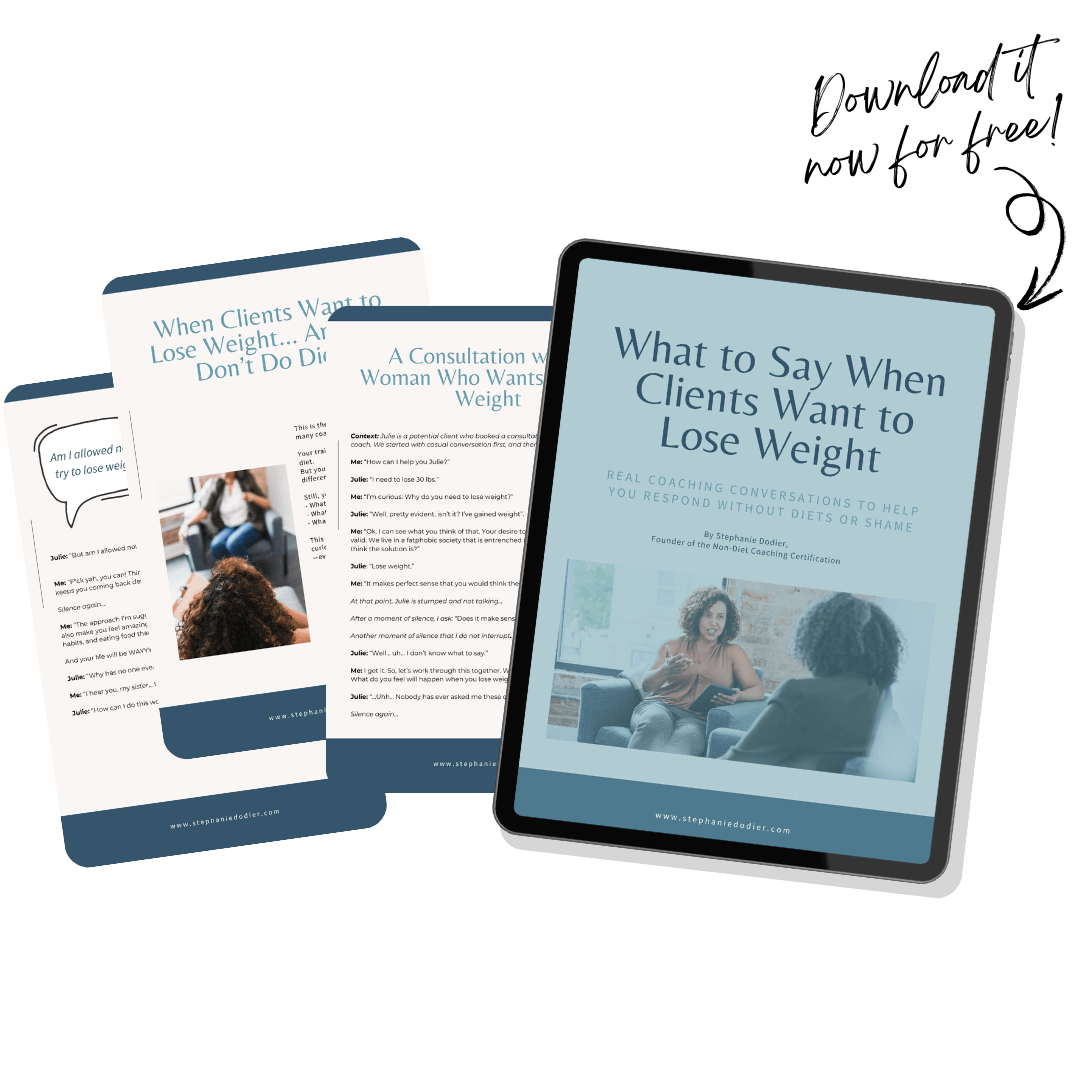

FREE GUIDE
What to say when a client want to lose weight
GET THE EXACT WORDS I USE IN REAL COACHING SESSIONS—WHEN WEIGHT LOSS COMES UP AND I’M HOLDING A WEIGHT-NEUTRAL STANCE


FREE GUIDE
What to say when a client want to lose weight
Get then exact word I use in real coaching session when weight loss comes up and I'm holding a weight-neutral stance
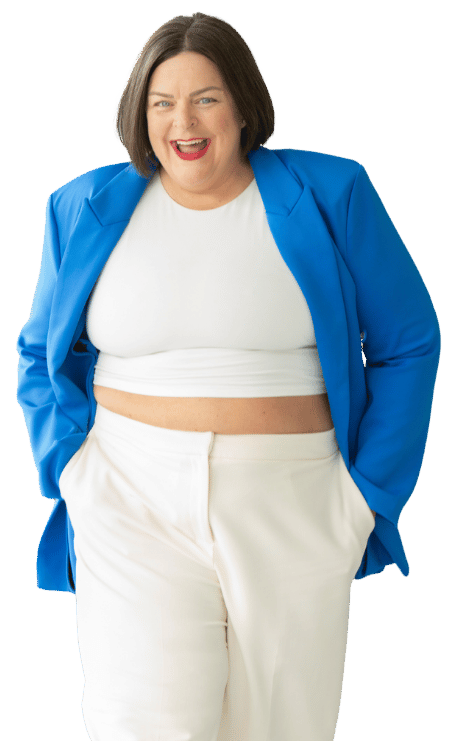

Welcome!
I’m Stephanie Dodier
I am a non-diet nutritionist, educator, and feminist business leader challenging everything we’ve been taught about food, health, and coaching.
I help health professionals confidently coach food and body without co-opting diet culture.
Join me in leading the health coaching revolution!
Ready? Let's do this!

